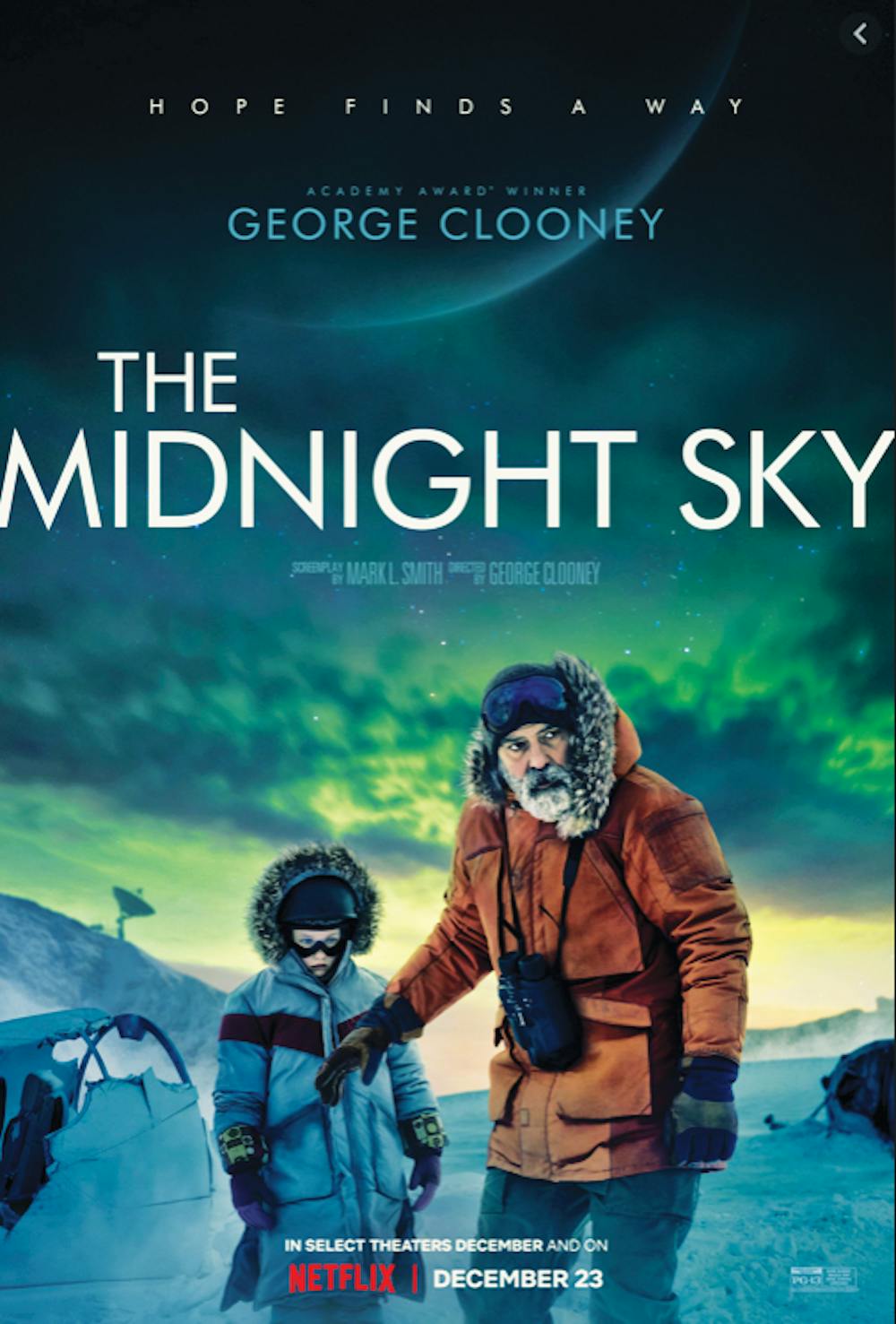The future can be as terrifying as it is exciting. As we all move through life anticipating what will come next as best we can, there are things that can easily fill us with dread. Among this is one of the most pressing issues of our lifetime: climate change. Even if the issue is not at the forefront of our collective consciousness, it is still something that looms over us all and worsens by the year. With that, the year 2050 sits ominously in the distance, marking a slew of predicted landmarks of irreversible damage to the environment and our planet. It should be no surprise that with this date, science fiction has begun to speculate how the world will be within the next few decades. One of the most recent examples of this is the late 2020 film “The Midnight Sky”, directed by George Clooney.
Unlike other apocalyptic movies, “The Midnight Sky” leans more heavily into atmospheric moments than adventurous; however, the stakes in the film are still high. Augustine, played by George Clooney, is determined to race to another base across the Arctic in time to contact one of the last online ships- the Aether. Alongside this ship’s crew, returning from their voyage to Jupiter moon K-23 and humanity’s last hope for survival must brave the odds themselves. Admittedly, the film’s pacing at times can be slow. The action that does happen seems fleeting or underwhelming in spite of the film’s build-up to these events. Yet there is something about the film that leaves the viewer lingering on the story.
One of the charms of “The Midnight Sky” is that it manages to ground itself much more into reality than other films of its genre. In science fiction, especially science fiction set in the near future, it is easy for creators to get ambitious with the technology they show in their stories, rendering the story more campy than poignant in the long run. However, the film manages to find a balance in its futurism. For instance, the crew constantly interacts with large holograms, the likes of which closely resemble our present-day VR but without the headsets. Other than that, and the crew’s spaceship, the tech in the movie is rather tame and reflective of our modern world: snowmobiles instead of hovercrafts, shotguns instead of lasers. These elements may not drastically affect the film, but it's one of the ways that this film feels real.
Most admirably though, what has stuck with me most about this film is its ending.
(Spoilers for the end of The Midnight Sky)
In short, it’s not all that happy. By the end of the film, it is revealed that Earth has become inhospitable for human life. Mass radiation and sickness have forced people to evacuate underground or travel to space. The time for mitigating climate change has long since passed. And after presumably succumbing to illness offscreen, Augustine passes peacefully while listening to Sully of the Aether, played by Felicity Jones, describing the beauty and potential of K-23. All that remains of the crew is the pregnant Sully and her partner, who set a course for Jupiter’s moon as life continues onward, as the state of humanity outside of the pair is left unclear.
In light of other post-apocalyptic fiction, this ending seems to take a more sullen approach to the genre. There is no last-minute solution that manages to save Earth as we know it, no small sign that shows that (pardon the meme) “nature is healing” in spite of a literal apocalypse. Yet in a way, it feels like a necessary approach to the genre.
As an avid fan of both fantasy and science fiction, I tend to favor optimistic stories to what can be referred to as “grimdark”- dark stories that try to portray so-called gritty realities. These genres tend to be some much-needed escapism as well as metaphorical enough where characters triumphing over obstacles feels more rewarding than them failing. However, the bittersweetness of “The Midnight Sky” feels deserved. One of the film’s strongest themes in the film is regret: Augustine regrets prioritizing his work over love and family and the opportunities he missed before the world fell apart. Although the degradation of the world is never explicitly explained in the film, only that mass radiation has contaminated the entire world, Augustine’s regret can be a message for the audience and our world today: take action now so we don’t regret losing the world we could have saved. This is of course easier said than done. Even with our best efforts on an individual level, the common person alone cannot be responsible for saving the planet. But nonetheless, humanity needs to take action before we reach a catastrophic point of no return.
“The Midnight Sky” may not be a perfect film, something reflected by both critics and audiences alike, however it feels like a necessary film that shows us our potential future if we don’t change our ways, but enough hope where change doesn’t feel so far out of reach.














